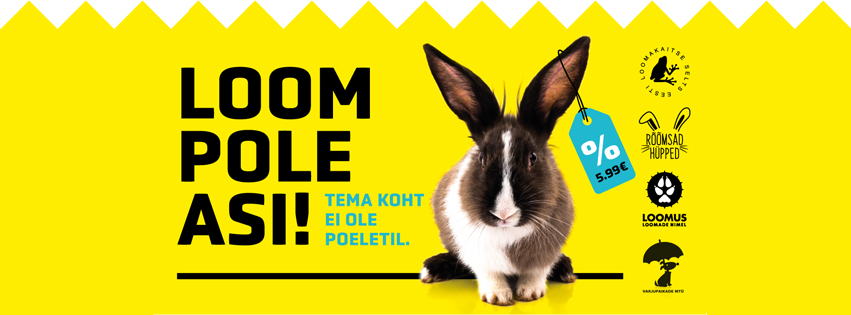Animal rights activists condemn the sale of pets in stores and believe that the Animal Protection Act should stipulate a ban on the sale of pets in stores. Four animal protection organizations launched a public initiative to collect signatures in support of a ban on selling animals in stores.
Loomus MTÜ (Loomus NGO), Eesti Loomakaitse Selts MTÜ (Estonian Animal Protection Society NGO, ELS), Varjupaikade MTÜ (Shelter Association NGO, VMTÜ), and Rõõmsad Hüpped MTÜ (Joyful Jumps NGO) jointly condemn the sale of pets in stores for the following reasons:
- Stores cannot ensure natural or suitable conditions for animals. For example, the requirements for keeping pets do not take into account the actual need for movement:
- The cage area for a rabbit must be 0.9 square meters (for a rabbit weighing up to 5 kilograms, less for a smaller rabbit), with an additional 0.45 square meters required for each subsequent rabbit;
- The cage area for a guinea pig must be 0.3 square meters, with an additional 0.15 square meters required for each subsequent guinea pig;
- For birds less than 16 cm long, a cage with an area of 0.31 square meters and a height of 0.6 meters is sufficient, with only a 0.03 square meter increase for each additional bird;
- The size of the cage/aquarium is not defined for reptiles, amphibians, fish, and invertebrates.
- A lot of employees responsible for animals lack adequate training and knowledge on how to care for the animals they sell;
- Due to harsh transport conditions, over half of the animals imported into Estonia either die or are sold in poor health. Based on ENDCAP, for every wild animal captured and sold as a pet, an estimated 50 animals die during transit;
- The breeding conditions of the animals are unknown, leading to potential hereditary health problems;
- Selling animals in stores does not guarantee that the new owner is capable and motivated to care for the animal, as there is no background check on the new owner;
- Selling animals in stores reinforces the societal perception that animals are objects or commodities, not sensitive living beings with intrinsic value.
In the second full week of November, the week of awareness of the relationship between humans and animals is also celebrated around the world, and in the framework of this, animal rights advocates urge everyone that the decision to adopt a pet should be thoroughly thought out. Before taking an animal, you must be sure that you are ready to take responsibility for the animal and ensure the necessary conditions for the animal.
We take the same to heart for those who have made the decision to sell animals in stores, because currently there is no background check on the new owner when buying an animal from a store, so we do not know if the owner is capable and motivated to take care of the animal.
“Selling animals in stores also deepens the perception in society that an animal is a thing or a commodity, not a sensitive living being with intrinsic value,” said Anu Tensing, a member of Loomus’ board. “Getting a pet shouldn’t be as easy as, for example, buying a chair.”
The signatories of the petition demand the following:
- Revoke Section 33.1 of the Animal Protection Act (Keeping pets in stores).
- Establish a ban on the sale of pets in stores in the Animal Welfare Act.
In addition to the initiators Loomus MTÜ, Eesti Loomakaitse Selts MTÜ, Varjupaikade MTÜ ja Rõõmsad Hüpped MTÜ following organisations also support the initiative: Eesti Vegan Podcast, Eestimaa Loomakaitse Liit, ajakiri Vegan, MTÜ Kurrmäu, Pesaleidja MTÜ, MTÜ Väikeste Loomade Abi, MTÜ Kassiabi, MTÜ NELI KÄPPA, MTÜ Tartu Kassikaitse.
Read more: https://rahvaalgatus.ee/initiatives/fc745635-82ac-413b-a675-0727701a839d?language=en. The initiative needs at least 1000 signatures in order to be successful. The signature collection will be open until 31.12.2023 and all Estonian citizens who are at least 18 years old are able to sign the petition. If the initiative is successful it will be sent to the Parliament.

